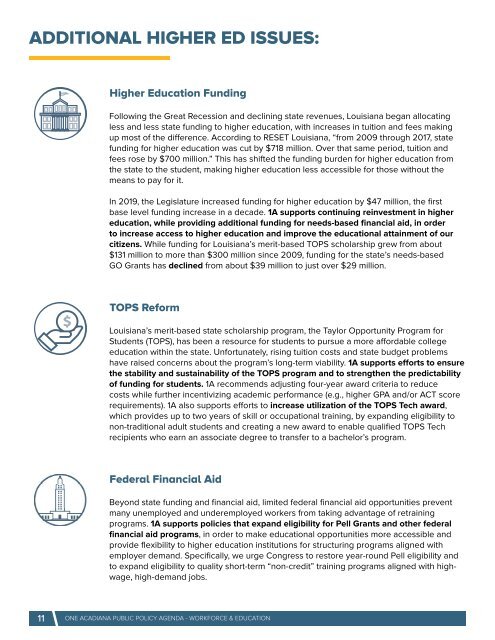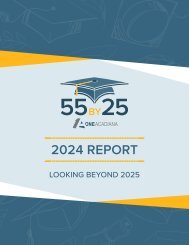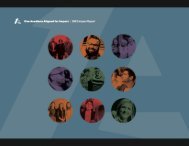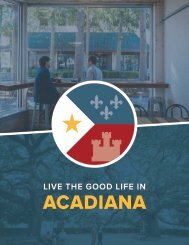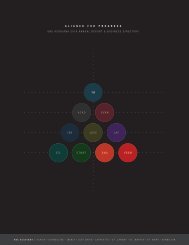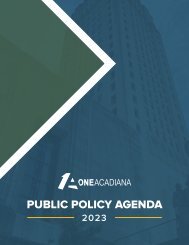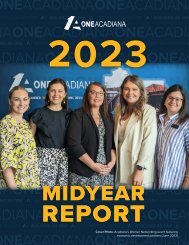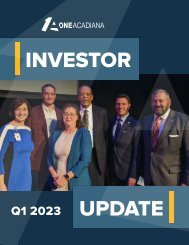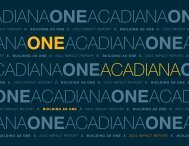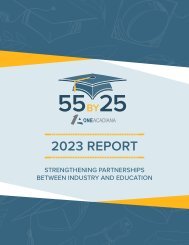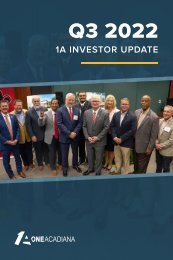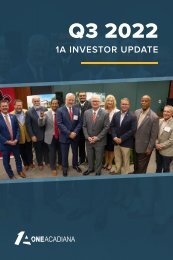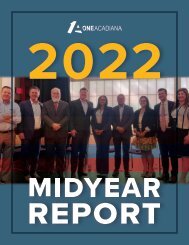1A_PublicPolicyAgenda_2021FINAL
You also want an ePaper? Increase the reach of your titles
YUMPU automatically turns print PDFs into web optimized ePapers that Google loves.
ADDITIONAL HIGHER ED ISSUES:<br />
Higher Education Funding<br />
Following the Great Recession and declining state revenues, Louisiana began allocating<br />
less and less state funding to higher education, with increases in tuition and fees making<br />
up most of the difference. According to RESET Louisiana, “from 2009 through 2017, state<br />
funding for higher education was cut by $718 million. Over that same period, tuition and<br />
fees rose by $700 million.” This has shifted the funding burden for higher education from<br />
the state to the student, making higher education less accessible for those without the<br />
means to pay for it.<br />
In 2019, the Legislature increased funding for higher education by $47 million, the first<br />
base level funding increase in a decade. <strong>1A</strong> supports continuing reinvestment in higher<br />
education, while providing additional funding for needs-based financial aid, in order<br />
to increase access to higher education and improve the educational attainment of our<br />
citizens. While funding for Louisiana’s merit-based TOPS scholarship grew from about<br />
$131 million to more than $300 million since 2009, funding for the state’s needs-based<br />
GO Grants has declined from about $39 million to just over $29 million.<br />
TOPS Reform<br />
Louisiana’s merit-based state scholarship program, the Taylor Opportunity Program for<br />
Students (TOPS), has been a resource for students to pursue a more affordable college<br />
education within the state. Unfortunately, rising tuition costs and state budget problems<br />
have raised concerns about the program’s long-term viability. <strong>1A</strong> supports efforts to ensure<br />
the stability and sustainability of the TOPS program and to strengthen the predictability<br />
of funding for students. <strong>1A</strong> recommends adjusting four-year award criteria to reduce<br />
costs while further incentivizing academic performance (e.g., higher GPA and/or ACT score<br />
requirements). <strong>1A</strong> also supports efforts to increase utilization of the TOPS Tech award,<br />
which provides up to two years of skill or occupational training, by expanding eligibility to<br />
non-traditional adult students and creating a new award to enable qualified TOPS Tech<br />
recipients who earn an associate degree to transfer to a bachelor’s program.<br />
Federal Financial Aid<br />
Reengaging Adult “Come-Backer” Students<br />
Approximately 49.5% of adults age 25+ in Louisiana – approximately 1.5 million adults –<br />
hold a high school diploma or less as their highest level of education. In other words, nearly<br />
half of Louisiana’s working-age population is not equipped for the majority of jobs in the<br />
21st century economy. <strong>1A</strong> supports innovative approaches to re-engaging these adults,<br />
particularly the 21.3% of Louisiana’s adults (650,000+) with some college but no degree,<br />
to reenroll and earn a degree or other credential of value.<br />
• Compete LA: <strong>1A</strong> supports the University of Louisiana System’s “Compete LA”<br />
initiative, which offers a variety of online degree programs and convenient class<br />
structures for adults with some college credit, along with personal coaches to help<br />
students navigate the process from re-enrollment through degree completion<br />
• Easing Pathways to Reenrollment: Student debt is a major barrier to adult student<br />
reenrollment and degree completion, as an outstanding balance may lead to<br />
registration and transcript holds until the debt has been repaid. <strong>1A</strong> supports efforts<br />
to mitigate student debt as a barrier to reenrollment and degree completion<br />
Higher Education Autonomy<br />
Without greater ability to control both revenue and costs, Louisiana’s higher<br />
education institutions will remain politically and bureaucratically hamstrung in training<br />
a skilled workforce.<br />
• Tuition and fee autonomy: Louisiana is the only state that requires a two-thirds<br />
vote of the Legislature to raise tuition. Comparisons of funding per student at peer<br />
institutions indicate that Acadiana colleges and universities lag behind peers in<br />
both funding per student and average state funding and tuition. A 2014 Tuition<br />
Task Force, established by the State Legislature, concluded that given Louisiana’s<br />
comparatively low tuition to regional and national peers, the state should consider<br />
a more market-based approach allowing management boards greater authority to<br />
determine tuition and fees at their institutions<br />
• Operational autonomy: A 2014 report by the National Center for Higher Education<br />
Management Systems found that Louisiana’s higher education institutions are<br />
among the most tightly controlled in the country in terms of procedural and<br />
operational regulations. Colleges and universities need substantially increased<br />
control over contracts (including capital projects), auditing, risk management,<br />
information technology, and travel, all of which are tightly regulated by current law<br />
Beyond state funding and financial aid, limited federal financial aid opportunities prevent<br />
many unemployed and underemployed workers from taking advantage of retraining<br />
programs. <strong>1A</strong> supports policies that expand eligibility for Pell Grants and other federal<br />
financial aid programs, in order to make educational opportunities more accessible and<br />
provide flexibility to higher education institutions for structuring programs aligned with<br />
employer demand. Specifically, we urge Congress to restore year-round Pell eligibility and<br />
to expand eligibility to quality short-term “non-credit” training programs aligned with highwage,<br />
high-demand jobs.<br />
11<br />
ONE ACADIANA PUBLIC POLICY AGENDA - WORKFORCE & EDUCATION<br />
ONE ACADIANA PUBLIC POLICY AGENDA - WORKFORCE & EDUCATION<br />
12


